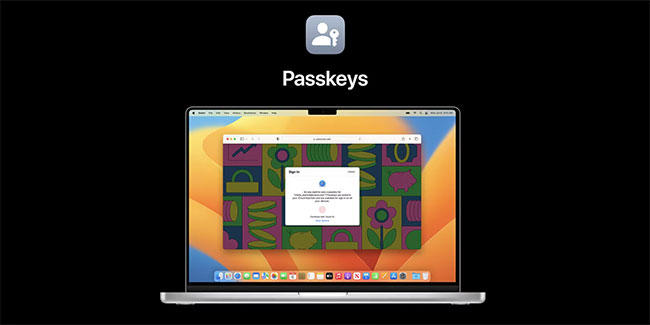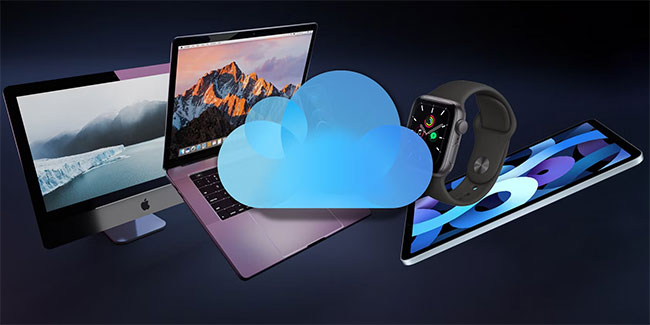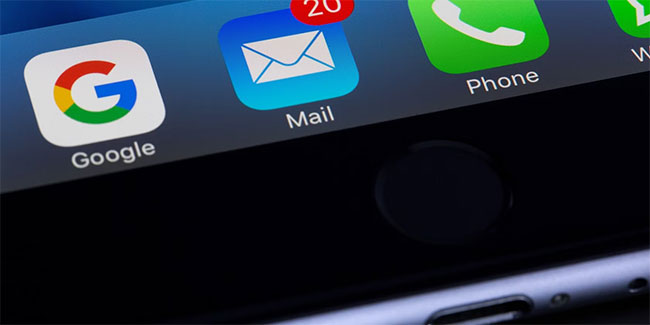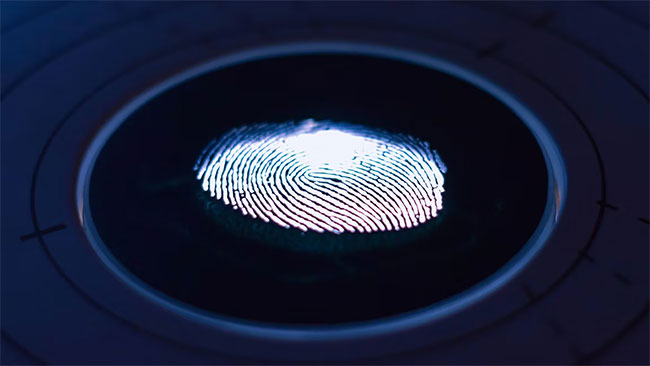Pros and cons of PassKeys feature on iOS 16
At WWDC 2022, Apple announced iOS 16, which promises to bring a host of new features to the iPhone. One of the standout features is Passkeys, which aims to eliminate the need for passwords on the web.
While this may sound exciting, Apple's Passkeys feature has its pros and cons. Let's find out more with TipsMake in the following article!
What is Passkey?

Passkey is a software technology that primarily uses facial ID and fingerprints to unlock applications. It eliminates the insecure password login technique, which is currently the most widely used security procedure for authentication.
Compared to passwords, passkeys are easy to use. They allow users to replace keystroke passwords with quick and convenient biometric verification.
As a result, tech giants like Google, Microsoft, and Apple could put an end to most types of phishing attacks and problems that arise from two-factor authentication that are specific to passwords.
Apple's implementation of Passkeys works by allowing users to use Touch ID or Face ID to authenticate app logins.
It's important to know both the pros and cons of Passkeys on iOS 16, as it's not the perfect feature you'd hope for. That way, you'll have realistic expectations when Apple rolls out Passkeys to your devices.
Advantages of PassKeys on iOS 16 for iPhone users
A future without security vulnerabilities seems promising and technologically secure. iOS 16 Passkeys is on the way to making this a reality. Here are 5 key advantages of iOS 16 PassKeys for iPhone users.
1. Sync passwords with iCloud

Having your passkeys on iCloud Keychain gives you end-to-end encryption, which means it ensures that not even Apple has access to your passwords.
You can also rest assured that through iCloud's encryption keys and cyberattack protection, you can always recover your passwords, even if your device is lost.
2. Passkeys provide additional security for users
The privacy that passkey provides to iPhone users is the assurance of end-to-end encryption. Since facial recognition and fingerprints are all you need to secure your device, you will not have the problem of cybercriminals hacking into your device.
3. Log in to apps and websites across platforms

Passkeys sync with iCloud Keychain, making them available across all your Apple devices. This eliminates the need for different passwords for your apps and websites.
According to Apple, you can even use your iPhone to log in to websites and apps on non-Apple devices, like your Windows PC or your friend's Android phone. All you have to do is authenticate with Touch ID and Face ID.
4. Users will not need to create or manage passwords again
While there are many different password managers out there, such as Dashlane, LastPass, LogMeOnce, BitWarden, RemeBear, 1Password, and Keeper, these password managers also require passwords that are vulnerable to cyber threats.
However, you don't need to worry about insecure passwords if you sign up using Apple's Passkeys implementation in iOS 16 and macOS Ventura.
5. Your account will not be attacked by phishing

Using passwords to manage your accounts provides you with a strong security technique that makes your accounts nearly impossible to hack.
Scammers and other unscrupulous people on the Internet are unlikely to be able to access your account by logging keystrokes and using other intrusive means.
Disadvantages of PassKeys on iOS 16 for iPhone users
The benefits of Apple's PassKeys implementation are huge. However, there are some limitations you should be aware of before using them. Let's take a look at them below:
1. Potential problems with cryptography
Cryptography largely relies on large prime numbers, which makes it quite difficult to hack. However, researchers hope that in the coming years, quantum computers will be able to break public-key cryptography. This would be a big problem if the passkeys couldn't be re-implemented with something more quantum-proof.
2. Websites may retain current passwords
It's important to note that it will take at least a few years for most Internet users to switch to using passkeys, as it's a huge transition.
If this eventually works, will your old passwords be destroyed when sites ask you to switch to passkey? The answer is probably no. So having a passkey-enabled device could be an issue if your other devices aren't compatible.
3. Problems arising from Face ID and Touch ID

The main problem with using biometrics alone is that small changes in a user's physical characteristics can render them ineffective, as they have been programmed to capture specific information.
So if you switch completely to PassKeys, you'll have a hard time ensuring that your face looks the same over time and your fingers stay clean.
4. User preferences
Since passkey is pretty limited to iOS 16 and macOS Ventura at the moment, only Apple users are likely to be early adopters of the feature.
However, some users prefer passwords and may not appreciate the complete switch to passkeys if Apple makes them the foundation of cybersecurity on their devices. Everyone's preferences are different and Apple needs to take that into consideration.
5. Uneven technological development speed
While Apple and the broader tech community may see passkeys as the future of tech security, it's worth noting that widespread deployment of the technology could backfire.
While much of the Western world may easily adapt to the use of passkeys, some developing countries may not adopt the technology as quickly. And if this does not happen, the very purpose of passkeys, which is to create a password-free world, may not be possible.
Apple's implementation of Passkeys in iOS 16 seems to be the future of online security. While the feature has its fair share of issues, it comes with a major development in the world of security technology.
As an iPhone user, you no longer have to remember passwords or worry about the security and safety of your device. It's a feature that many people will appreciate, so developers will have to make a deliberate and ongoing effort to address the challenges listed above.
You should read it
- ★ Advantages and disadvantages of dual boot (dual boot)
- ★ What is VPN? Advantages and disadvantages of VPN virtual private network
- ★ Advantages and disadvantages of the Internet
- ★ What is HD-SDI camera? Outstanding advantages and disadvantages of HD-SDI camera
- ★ Advantages and disadvantages of Wifi and wired networks